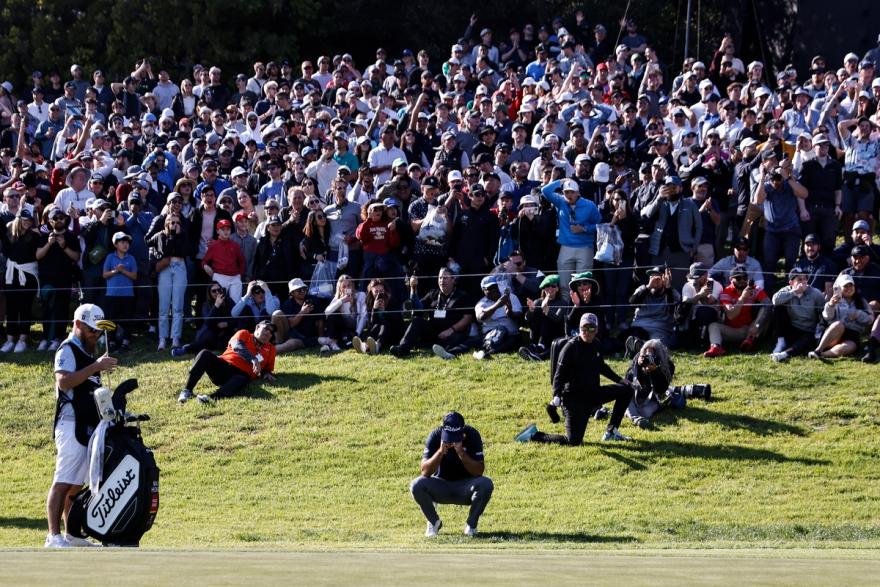LOS ANGELES — It’s easy to lean into movie metaphors when you get here. Practically everyone does it. The light is so often perfect. The people can seem disproportionately beautiful. Houses and cars are frequently so ostentatious, they look more like film props.
Riviera Country Club embodies all of this. It was built in the 1920s as a playground for the wealthy, and at the time, it was one of the most expensive golf courses ever constructed. Nearly 100 years later, it still feels like a movie set. The sight lines are magical. The fairways look like green cashmere. The crooked Sycamore trees that abutt many of the holes loom, particularly late in the day, like ghosts.
It’s always been the perfect setting to wrap up the PGA Tour’s West Coast Swing and this year’s has already been as good as any in recent memory. Max Homa, who grew up in Valencia and is the son of an acting coach, framed it in cinematic terms early in the week, well before the first shot was hit at the Genesis Open. As I floated my way around Riv, I couldn’t stop thinking about it.
“I think it’s kind of climaxing like a movie,” Homa said, referring to the season’s opening act.
So many storylines were unfolding, it was hard to keep track of them all. Tiger Woods’ return to the PGA Tour for the first time in three years; Jon Rahm’s quest to seize what felt like an inevitable No. 1 ranking; Homa’s continued ascension; Rory McIlroy trying to balance his role as shadow commissioner and generational talent; Netflix debuting “Full Swing,” its long-awaited documentary series about professional golf. Each felt worthy of its own short film.
Instead of one clean narrative — Jon Rahm proved to everyone he is the best golfer in the world! — I wanted to sit for a minute with each moment that I saw or heard about during the week.
Just one spoiler: Not everyone walks away with a happy ending.
• • •
Tom Kim was a little nervous prior to the Genesis. He wanted everything to go well. It wasn’t the golf that was stressing him out. It was a decision about food.
At age 20, Kim had been part of the PGA Tour for roughly half a season. He was still getting to know the majority of his peers. At the Presidents Cup in September, he’d played with such energy and emotion for the International squad, even in defeat, that he’d emerged as one of the event’s most memorable stars. His personality and enthusiasm are infectious. But life on Tour, particularly when you’re young, can be lonely.
Kim decided he’d take up residence in Dallas so he could be close to his swing coach, Cameron McCormick. When Jordan Spieth and his wife Annie heard he was planning on spending Christmas dinner by himself, they insisted he come over to their house for prime rib. He spent much of the evening playing with the Spieths’ son, Sammy.
Kim realized he wanted his new friends to learn a bit about him and his culture, so in the weeks leading up to the Genesis Invitational, he invited a large group of them out to eat Korean barbecue. After spending the day together at a Titleist commercial shoot, Spieth, Homa, Justin Thomas, Jim “Bones” McKay and Michael Greller all took him up on the invitation.
“Since it’s LA, it’s a great spot for Korean places,” Kim said. “I wanted them to have at least a good experience with Korean food, because I’m very picky with my Asian food. I thought it was a good time to bond with those guys.”
Kim insisted on picking up the check, even though Spieth, Thomas and Homa have won close to $125 million combined on the PGA Tour. He even sheepishly admitted at one point that he’d tried out the restaurant ahead of time, just to be certain it was up to his standards.
“I wanted to make sure it was a good time,” he said. “I had some time in LA prior to this trip, so I checked out all the food. I think all the guys enjoyed it.”
In his first start at Riviera, Kim was paired with Homa and Xander Schauffle for the first two rounds. He went on to finish T45.
• • •
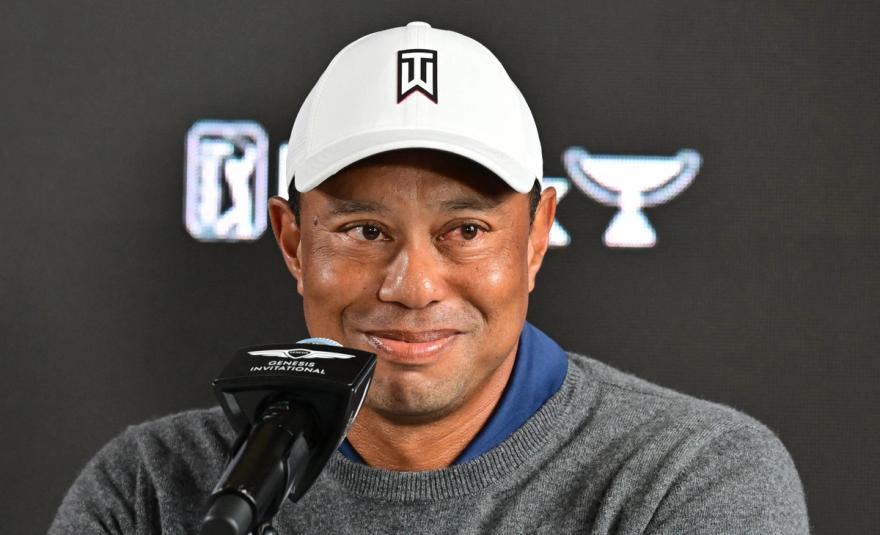
Tiger Woods wasn’t limping. That was the first thing everyone noticed when he walked into the interview room Tuesday afternoon. His gait seemed better in 2023 than it was in 2022, if such a thing is even possible to measure.
He also seemed to be in a happy mood. He talked about how much his ankle had improved, and how his endurance had increased. He was optimistic, but also trying to be realistic about his body. He understood he has a finite number of swings left in his body, even if that number remains unclear.
“When you get a little bit older and a little bit banged up, you’re not as invincible as you once were. That’s the reality of all of us aging,” Woods said. “I remember as a kid growing up, watching John Elway speak and just crying saying ‘I can do it but my body won’t allow me to do it anymore.' I’ve gotten to that point a couple times.”
Early in his press conference, Woods had mentioned his hero, Arnold Palmer, playing in 50 Masters. He used it as a way to illustrate how different golf was from contact sports. His answer got me thinking: Was there a part of him that was softening in his late 40s? Could he envision a day when he could play tournament golf without waking up that morning convinced he could win the tournament? Could he picture himself playing golf in a competition rather than playing competitive golf.
“I have not come around to the idea of being…” Woods said, and then there was a noticeable pause.
He closed his eyes. It felt like he was mulling a snippet of a future he wanted no part of.
“If I’m playing, I’m playing to win,” Woods said, and he let the words hang in the air for a second. “I know that players have played and tried to be an ambassador for the game and tried to grow the game. I can’t wrap my mind around that as a competitor. If I’m playing in the event, I’m going to try and beat you. I’m there to get a W. I don’t understand how making a cut is a great thing. If I enter an event, it’s always to get a W.”
He apologized for cutting me off. But I wondered if a part of him wanted to shout: Dude, do you even know me at all?
Woods’ soaring ball speed and his opening 69 and Saturday 67 were proof that his good is still good enough to win No. 83. The 74 and 73 on either side were reminders of his new reality. He finished T45.
• • •
Rory McIlroy looked weary. He admitted he was looking forward to the day when he can be just a golfer again. When he can play with a clear head and not feel obligated to give a monthly state of the union address to the media about the future of the PGA Tour.
But that day, he concedes, has not arrived yet.
“Would I love to just get back to playing golf at some stage? Absolutely,” McIlroy said. “But there's still a lot of stuff that needs to be decided. For better or for worse, I'm part of that conversation, I'm on the board of the Tour, and I need to be a part of it.”
On Wednesday, McIlroy held court with the media after his pro am, answering the kind of questions that probably should be directed at PGA Tour commissioner Jay Monahan, although virtually no one believes Monahan would handle them as deftly as McIlroy frequently does. Monahan’s strength is forming business partnerships, not public speaking (as he has repeatedly demonstrated.) And so much of the burden has fallen on McIlroy, particularly in the LIV Golf era, to answer questions or address rumors frequently floated about looming structural changes the Tour is mulling.
For example: Will designated events, in the future, have 70 player fields and no cut? Will this be the end of underdog stories? Who is looking out for the bottom half of the Tour while the top guys get rich?
Patiently, but not without hints of exasperation, McIlroy answered each one.
“The best players should be playing in [designated events] because ultimately the PGA Tour needs to be built around the best players because that's what will maximize the value of the product,” McIlroy said. “But that doesn't mean that there's not great storylines further down that list, which we're all very cognizant of. I've had tons of conversations with guys that are worried about what events they're going to play next year and all that. The one thing I said, look, no one's trying to screw the bottom half of the tour here. If anything, we're trying to lift it up.”
The NBA, McIlroy pointed out, wasn’t built around protecting the interests of the 12th man. It was built around its stars. And in the long run, the 12th guy on every bench was lifted up by the financial windfall the stars generated.
“Does it mean that the Tour's going to get more competitive? Yes,” McIlroy said. “I honestly think that’s a good thing.”
After a strong start to the week, McIlroy failed to break par on the weekend and finished T29.
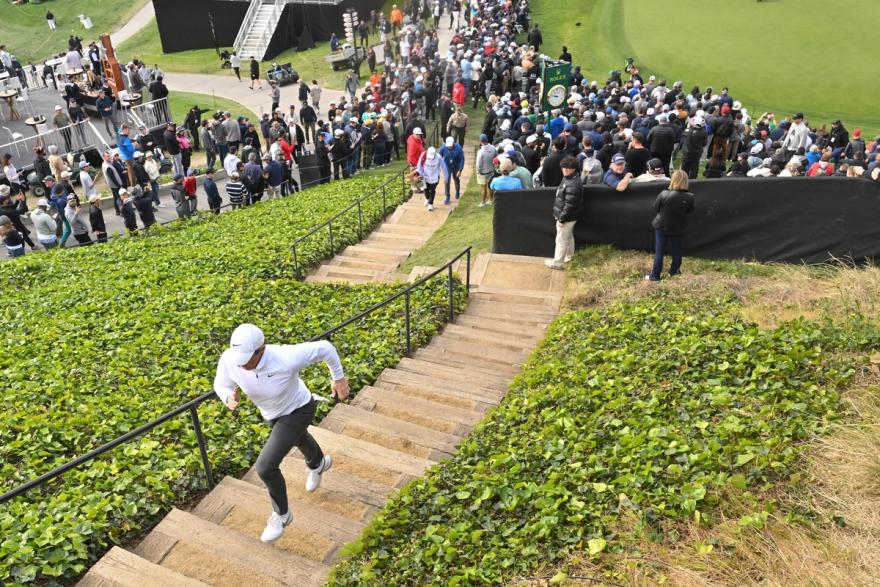
• • •
Aaron Rai wasn’t asked to be part of the Genesis Pro Am.
As the 127th-ranked player in the world, that wasn’t a surprise. Not every player in the field ends up with a spot. With temperatures in the mid-40s, and the wind whipping, most players would have viewed it as a blessing. Rai, a 27-year-old Englishman, instead viewed it as the opportunity of a lifetime.
He decided to brave the cold and follow his hero Tiger Woods.
“I’ve never gotten a chance to watch him up close,” Rai said. “I thought walking the back nine with him would be the perfect chance to get close to him and just see some of the shots he hits. To try and see what he sees. I didn’t expect to meet him.”
It is a testament to Woods’ aura and accomplishments that, at age 47, he still makes many of his peers nervous. So many of them grew up with his picture on their wall. They immediately feel like a kid when they’re in his orbit. Rai figured he’d hang around the periphery of holes, taking mental notes, making certain he wasn’t bothering Woods. But Rob McNamara, Woods’ friend and associate, recognized Rai on the 11th hole. He called Rai over to meet Woods.
“It was great,” Rai said. “He was great. He made me feel very comfortable. I would have been too scared to approach him otherwise. I was pretty nervous just saying hello. It was incredible really. As bad as it sounds, it was probably the highlight of my week.”
Rai said he couldn’t help but think back on the worn VHS tapes of Woods he and his father watched during his childhood. From the age of 5 until his teenage years, Rai estimates he watched them two or three times a week. To see some of the same shots in person was enough to make his heart soar.
“On No. 11, the wind was off the left and hit this real low stinger drive that probably didn’t get 30 feet off the ground,” Rai said. “And then three holes later, it was downwind and he hit this towering pitching wedge way up in the sky and got it to spin and stop. It was so special.”
Making his second start at Riviera, Rai finished the week 4 under par, three ahead of Woods.
• • •
Jordan Spieth was grinding. There was barely any light left in the sky. The putting green was empty except for he and caddie Michael Greller.
Spieth was rolling four footers, again and again, working on his start line, working on his path, trying to find a feeling he could take to the course the next day. His putts kept leaking right. Poa annua grass can be maddening that way.
He’d only played one round, but already Spieth knew he was going to have to fight just to play the weekend. He’d lost 2.3 strokes to the field on the greens on his way to a listless 74. It was a similar story to what happened in Phoenix, where he led the field in ball striking, and ranked near the bottom in putting, a skill that once made him look like a magician.
How do you recapture the magic of putting when it disappears inexplicably? The answer is: There is no magic. There is only more practice.
You put in the work for as long as the sunset, or your patience, will allow.
After a second-round 70, Spieth missed the cut at Riviera for the first time in seven years.
• • •
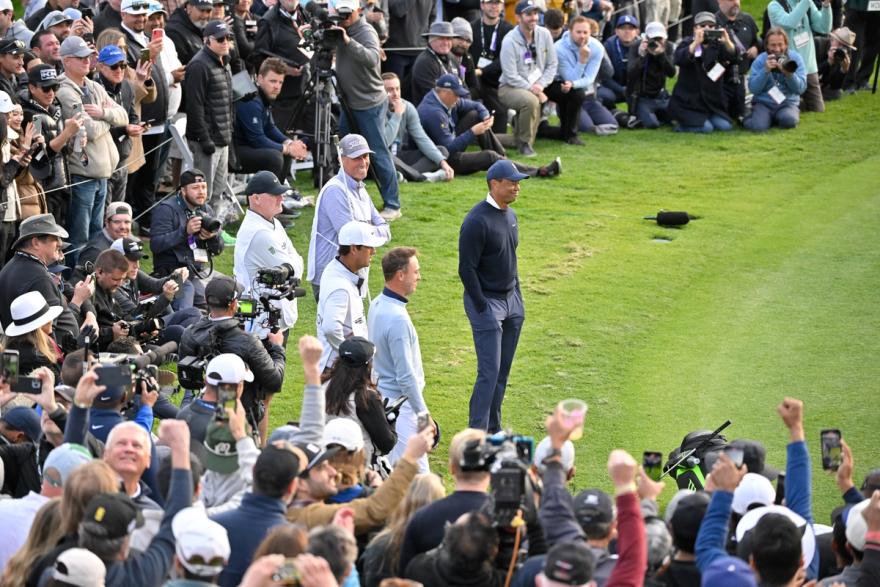
Justin Thomas was shaking his head. He couldn’t stop smiling.
Tiger Woods had just glanced at him and shrugged his shoulders on the 18th green after making a third consecutive birdie. The crowd, four deep in some places, was going bonkers. It was the kind of day Thomas had always dreamed about, and now he would likely remember it forever. As Woods climbed the hill, you could tell it meant something to him too. A man who once walked through crowds with his head down now had his hands out, high-fiving anyone within reach.
Thomas and Woods have bonded in recent years, particularly since Woods nearly lost his leg in a car accident, to the point where they treat each other mostly like brothers. Each is an only child, which is important for reasons psychologists could better explain. Their affection takes the form of ribbing and teasing, as is often true with men who need their friends but struggle with the idea of vulnerability.
That’s as decent a roadmap as any to explain how we ended up engrossed in a discourse about tampons and misogyny in the middle of a golf tournament.
Woods would later explain he was trying to play a prank on Thomas in the middle of the round after he out-drove him on the 9th hole and then surreptitiously handed him a tampon from his golf bag as they walked toward the fairway. (After pictures surfaced revealing the handoff, Woods apologized to anyone he might have offended.)
It was not a particularly creative or funny joke, though it was in line with much of Tiger’ humor, and a strong case can be made that many of the world’s ills can be traced back to the idea that weakness in men somehow makes them feminine, and thus worthy of mockery. If anyone ought to have moved beyond the crassness of tampon jokes, it’s a 47-year-old divorced dad with a 15-year-old daughter. Alas.
Yet as the outrage cycle ramped up in the most predictable manor, with most of the people defending Woods’ right to make a bad joke eager to combat a wave of outrage that, in reality, barely existed, I was struck by something:
Tiger Woods really loves Justin Thomas like a little brother. He might not bring himself to say it, but he wants him to know it. It’s a common theme in a lot of male relationships. We crack bad jokes because it helps many of us avoid saying the hard stuff.
As lame as I find Woods’ jokes, I’m grateful he has Thomas. I bet Thomas is grateful too.
• • •
Jon Rahm was nervous. He wasn’t sure why, exactly.
It was Saturday night. He was leading the golf tournament by three shots over Homa. A win would elevate him back to No. 1 in the world. He’d just shot a 65 on a difficult set up and he seemed in control of all aspects of his game. He’d even been blessed with several fortunate bounces, including a Friday ricochet of the grandstand next to 17 that led to an unlikely eagle. Even fortune appeared to be on his side.
And yet, he couldn’t relax. From the outside, people assumed he was unflappable. Homa joked that Rahm was like Thanos in the Marvel movies, a destroyer of worlds. In private, Rahm knew the truth. He was not immune to the anxieties that weigh you down when you’re chasing greatness.
He decided to play with his children. He loved being a dad more than he loved just about anything, including golf. Chasing around his oldest son, Kepa, helped him unplug from the intensity that so often powered him on the course.
“It's the fact that they don't care, nor should they, right?” Rahm said. “When I walk through the door, I'm dad, period. It's a good way to put some perspective in me. I'm a good golfer, but I strive to be an even better dad, husband and friend. That's the priority to me. That's why when I get home it makes things a lot easier. Following after him, running around, playing, it's so rewarding. It's like a natural recharge for my brain and myself. I don't know, it just makes me so happy that puts me in a really good spot and gives me a lot of perspective of what really matters.”
Rahm needed that perspective as played the back nine on Sunday. He’d let the lead slip away briefly after bogeys on 10 and 12, but a 45-foot birdie putt on 14 gave him back the lead. Now he was standing on the 16th tee with a one shot advantage, staring down the flag from 158 yards, looking like he wanted to strangle it.
“It’s a 150 shot,” said Adam Hayes, Rahm’s caddie. “Trust it. It’s the perfect number."
Rahm lashed at the ball with an 8-iron like a graceful lumberjack, launching it into the sky with cut spin so that it tracked back toward the flag.
“Be the freaking number, come on,” Rahm growled.
The ball tumbled from the sky and nearly hopped into the cup on its third bounce. It stopped two feet away. The 28-year-old Spainiard gave an understated, below-the-waist fist pump. He knew he had essentially slammed the door.
“That was probably my best swing of the week,” Rahm said afterward.
An hour later, he was kissing his son Eneko and lifting him high above his shoulders, fully re-engaged in Dad Mode, even though Rahm was still standing on the 18th green.
“What happens on the golf course kind of seems, it's very minimized, right?” Rahm said. “It's not nearly as satisfying as that is.”
With the win, Rahm reascended to the top spot in the world rankings. He’s won five of his last nine worldwide starts.
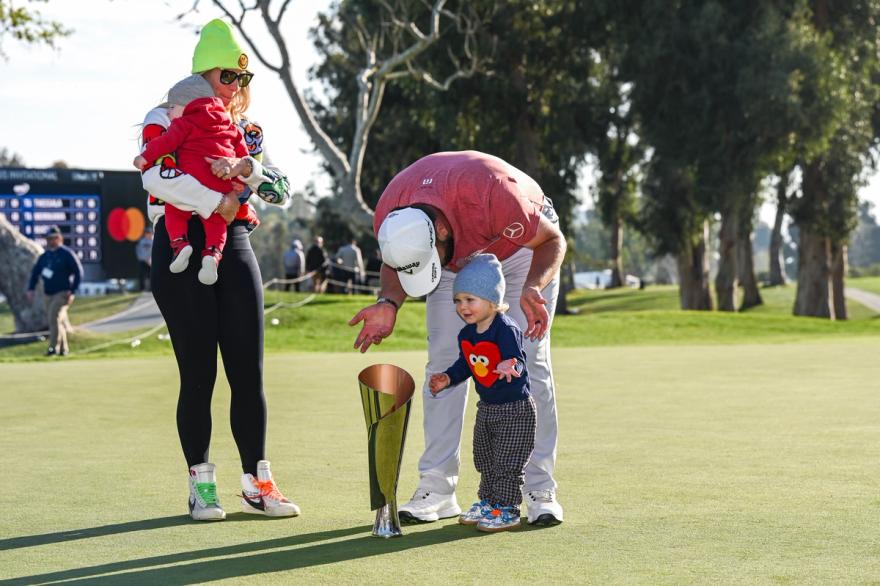
• • •
Max Homa was trying to keep it together. He wasn’t sure where all the emotion was coming from, because for 15 minutes after the round had ended, he’d been fine. Pissed off, but otherwise fine. Now, as he was taking questions from the media, tears were welling up.
“I’m sorry. This tournament just means a lot to me,” Homa said. “It’s like an emotional release.”
He’d wanted to win so much this year, it was hard to put it into words. When he won the Genesis in 2021, it represented a huge moment in his career, but almost no one he loved saw it in person. Fans weren’t allowed to attend that year because of COVID. Riviera was the tournament he’d loved the most as a kid, the one he’d attended long before professional golf felt like a reality, and he’d wanted to win it not for himself, but for his parents, his wife and his friends. Seeing that possibility slip away was eating at him.
“I’m very proud,” Homa said, his voice catching in his throat. “I did not have it off the tee today, but man, I fought.”
He’d hit so many good shots over the course of four days, it was hard to feel disappointed with the few bad ones. (He became just the fifth player in the last ten years to birdie the 10th hole all four rounds.) On 18, Homa still had a chance for a miracle. If he chipped in from just off the green, it would at least force Rahm to two-putt from 37 feet to avoid a playoff, but the chip he was facing looked impossible. He’d have to throw it up in the air and try to bang it off the pin, the degree of difficulty similar to a half court shot at the buzzer.
“It’s amazing what willing something to happen can do to both the ball and to your body,” Homa said. “All I saw was the hole. I got in a little bit of a mini zone where all I saw that ball doing was landing where it did, bouncing, breaking right and just crushing the flag.”
He could feel his heart racing when the ball started tracking. But when the ball clanged off the pin and lipped out, he fell to his knees, burying his face in his hands.
“I didn't want it to be over, and when that missed, it was over,” Homa said.
He made his way up the hill to sign his scorecard. Hundreds of little kids were screaming his name, begging for autographs. He was still in a daze. Tiger offered Homa a hug on the putting green while he milled about, uncertain of where he should go next. Eventually he found his family.
“I’m gonna win this [tournament] again and be able to do it in front of all these people,” Homa said.
He hugged them goodbye and slowly made his way toward the locker room. He cursed under his breath as he reached the doors. It was time to leave. It was getting dark.
With the second place finish, Homa moved to No. 8 in the Official World Golf Rankings, becoming a Top 10 player for the first time in his career.
